Related Research Articles
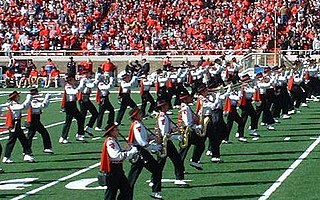
A marching band is a group of instrumental musicians who perform while marching, often for entertainment or competition. They are most popular in the United States, though not uncommon in other parts of the world. Instrumentation typically includes brass, woodwind, and percussion instruments. Most marching bands wear a uniform, often of a military style, that includes an associated organization's colors, name or symbol. Most high school marching bands, and some college marching bands, are accompanied by a color guard, a group of performers who add a visual interpretation to the music through the use of props, most often flags, rifles, and sabers.
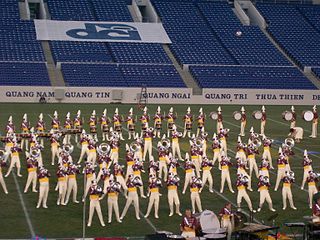
A modern drum and bugle corps is a musical marching unit consisting of brass instruments, percussion instruments, electronic instruments, and color guard. Typically operating as independent non-profit organizations, corps perform in competitions, parades, festivals, and other civic functions. Participants of all ages are represented within the corps activity, but the majority are between the ages of 13 and 22 and are members of corps within Drum Corps International.

Camping is a form of outdoor recreation or outdoor education involving overnight stays with a basic temporary shelter such as a tent. Camping can also include a recreational vehicle, sheltered cabins, a permanent tent, a shelter such as a bivy or tarp, or no shelter at all. Typically, participants leave developed areas to spend time outdoors, in pursuit of activities providing them enjoyment or in a form of educational experience. Spending the night away from home distinguishes camping from day-tripping, picnicking, and other outdoor activities.

The Alabama School of Mathematics and Science (ASMS) is a public residential high school in the Midtown neighborhood of Mobile, Alabama. ASMS is a member of the National Consortium of Secondary STEM Schools (NCSSS). It graduated its first class in 1993.

A summer camp or sleepaway camp is a supervised program for children conducted during the summer months in some countries. Children and adolescents who attend summer camps are known as campers. Summer school is usually a part of the academic curriculum for a student to make up work not accomplished during the academic year.

A drum major or field commander is the leader of a marching band, drum and bugle corps, or pipe band, usually positioned at the head of the band or corps. The drum major is often dressed in more ornate clothing than the rest of the band or corps and is responsible for providing commands to the ensemble, leading them while marching, and directing them what to play, when to play, the dynamic or volume of playing, and what time to keep. The commands may be given verbally, through hand gestures, using a whistle or a baton, or with a mace. Although the drum major is the one conducting for the entire band to see and watch to keep time, the drum major is actually looking at the center snare's feet to keep time. The center snare is the leader of the drumline, and is the one who keeps the band in time while marching. They usually play, tap and/or rolls to set the tempo of how fast the band marches.
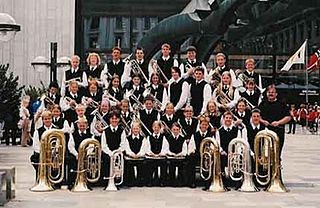
A school band is a group of student musicians who rehearse and perform instrumental music together. A concert band is usually under the direction of one or more conductors. A school band consists of woodwind instruments, brass instruments and percussion instruments, although upper level bands may also have string basses or bass guitar.

Music education is a field of practice in which educators are trained for careers as elementary or secondary music teachers, school or music conservatory ensemble directors. Music education is also a research area in which scholars do original research on ways of teaching and learning music. Music education scholars publish their findings in peer-reviewed journals, and teach undergraduate and graduate education students at university education or music schools, who are training to become music teachers.
The University of Alabama is a school with many traditions. This article describes several of these traditions.

Outdoor education is organized learning that takes place in the outdoors, typically during school camping trips. Outdoor education programs sometimes involve residential or journey wilderness-based experiences in which students participate in a variety of adventurous challenges and outdoor activities such as hiking, climbing, canoeing, ropes courses and group games. Outdoor education draws upon the philosophy, theory, and practices of experiential education and environmental education.

Brauer College is a government secondary school, located in Warrnambool, Victoria, Australia.

St Leonard's College is an independent co-educational school in Melbourne, Australia. Located in Brighton East, the school caters for students in all year levels from ELC for three-year-olds to Year 12.
Benedictine High School is a private, Roman Catholic, college preparatory high school for boys, located in Cleveland, Ohio, United States. The school serves grades 9–12 and has an enrollment of over 340 students for the 2017–2018 school year. It is a part of the Roman Catholic Diocese of Cleveland. Benedictine's sister school is Beaumont School of Cleveland Heights.

Formed in 1845, the Holy Cross Goodtime Marching Band is one of the oldest organizations at The College of the Holy Cross in Worcester, Massachusetts, USA, and one of the oldest college bands in the United States. The Crusaders Marching Band first began performing at football games in 1910 and the band's role has expanded significantly since to include other athletic appearances, performing at all home football games, selected away games, in exhibition at high school band competitions, and at various events throughout the country. In the spring, the marching band converts into the Holy Cross Crusader Pep Band and plays at all home basketball games, and travels with the teams to the NCAA tournament. The Marching Band performs at Fitton Field while the Pep Band plays in the Hart Center.

Concordia College (CC) is an ELC–12 independent, co-educational, Lutheran school with campuses located in the Highgate and Blackwood areas of Adelaide, South Australia. Established in 1890, the college is a school of the Lutheran Church of Australia and has been an International Baccalaureate (IB) World School since January 2001, offering the IB Primary Years and Middle Years Programmes.

The Iowa State University Cyclone Football 'Varsity' Marching Band (ISUCF'V'MB) is the marching band of Iowa State University. Also known as the Cyclone Marching Band (CMB), it is nicknamed the "Pride of Iowa State", the "Best of the Midwest", and the "Varsity Band". The band performs in support of the Iowa State Cyclones football team at all home games and at some away games versus Big 12 Conference rivals. The band plays at high school band festivals, indoor concerts, and post-season bowl games.
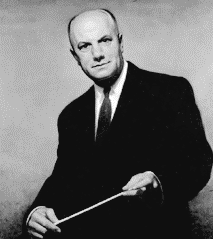
William D. Revelli was an American music educator and conductor best known for his association with the University of Michigan, where he directed the university's bands including the Michigan Marching Band 1935 to 1971. During his 36 years as director, the Michigan Marching Band won international acclaim for its musical precision. Revelli is also credited with innovations that moved college marching bands across the country away from rigid military formations. Among other things, Revelli’s Michigan Marching Band was the first to synchronize music and movement and the first to use an announcer.

The Wildcat Marching Band (WMB) is the marching band of the University of Kentucky, located in Lexington, Kentucky. The WMB performs at all UK home football games and selected away games. The WMB's repertoire ranges from contemporary jazz to classical favorites. Any UK, BCTC, or Transylvania University student, regardless of major, is eligible for membership. The Wildcat Marching Band is directed by Dr. Shayna Stahl.
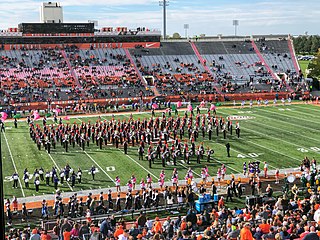
The Falcon Marching Band, known also as the FMB, is the marching band of Bowling Green State University. It features a symphonic sound and chair step marching. Under the direction of Jonathan “Jon” Waters, marching band is the largest student organization on campus. The band performs at all home football games, which are hosted in Doyt Perry Stadium as well as other various university functions.

Carrie Murray Nature Center (CMNC) is operated by Baltimore City Recreation and Parks. CMNC offers environmental education programs for children, families, and adults as Baltimore City's only nature center. A native live animal collection, outdoor bird aviary, and indoor exhibits are features of the center, which is nestled in the expansive and historic Gwynns Falls/Leakin Park, the largest urban forested park east of the Mississippi River.
References
- ↑ Music Education in the United States: Contemporary Issues. Alabama: University of Alabama Press. 1988. p. 264. ISBN 9780817303693 . Retrieved 16 February 2021.
- ↑ Hernandez, Michele (October 1, 2002). Acing the College Application: How to Maximize Your Chances for Admission to the College of Your Choice. Random House Publishing Group. p. 41. ISBN 9780345462022 . Retrieved 16 February 2021.